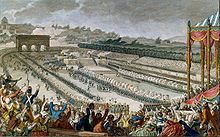On this day in 1790, the citizens of Paris celebrate the constitutional monarchy and national reconciliation in the Fête de la Fédération.
 The Fête de la Fédération of the 14 July 1790 was a huge feast and official event to celebrate the establishment of the short-lived constitutional monarchy in France and what people of the time considered to be the happy conclusion of the French Revolution, the outcome hoped for by the monarchiens.
The Fête de la Fédération of the 14 July 1790 was a huge feast and official event to celebrate the establishment of the short-lived constitutional monarchy in France and what people of the time considered to be the happy conclusion of the French Revolution, the outcome hoped for by the monarchiens.
The Fête de la Fédération in Paris was the most prominent event of a series of spontaneous celebrations all over France: from August 1789, Fédérations appeared in towns and countryside; on 5 June 1790, with lots of individual feasts to celebrate the new state of France, a constitutional monarchy. The National Assembly approved the suggestion by the Commune de Paris to organise a “general Federation”. Organised late, it was largely an improvisation. The idea was not to contest the legitimacy of the king Louis XVI, but to show the general will for stable institutions and a national reconciliation and unity. In the words of Jean Sylvain Bailly, astronomer and mayor of Paris: “We suggest that this meeting (…) be sworn on the next 14 July, which we shall all see as the time of liberty: this day shall be spent swearing to uphold and defend it”. Charon, President of the Commune of Paris, stated: “French, we are free! French, we are brothers!”.
The event took place on the Champ de Mars, which was at the time far outside Paris. The place had been transformed on a voluntary basis by the population of Paris itself, in what was recalled as the Journée des brouettes (“Wheelbarrow Day”).
Official Celebration
The feast began as early as four in the morning, under a strong rain which would last the whole day (the Journal de Paris had predicted “frequent downpours”).
14 000 Federated (Fédérés) came from the province, every single National Guard unit having sent two men out of every hundred. They were ranged according to their département under 83 banners. They were brought to the place were the Bastille once stood, and went through Saint-Antoine, Saint-Denis and Saint-Honoré streets before crossing the temporary bridge and arriving at the Champ de Mars. Deputies from other nations, “Swedes, Spaniards, Polacks, Turks, Chaldeans, Greeks, and dwellers in Mesopotamia,” representatives of the human race, “with three hundred drummers, twelve hundred wind-musicians, and artillery planted on height after height to boom the tidings all over France, the highest recorded triumph of the Thespian art.”
A mass was celebrated by Charles Maurice de Talleyrand, bishop of Autun under the Ancien Régime. The very popular General marquis de La Fayette, as both captain of the National Guard of Paris and confident of the king, took his oath to the Constitution:
” We swear forever to be faithful to the Nation, to the Law and to the King, to uphold with all our might the Constitution as decided by the National Assembly and accepted by the King, and to protect according to the laws the safety of people and properties, transit of grains and food within the kingdom, the public contributions under whatever forms they might exist, and to stay united with all the French with the indestructible bounds of brotherhood[ ”
It is noticeable that at this time, the French Constitution of 1791 was not yet written; it would only take effect in September 1791. La Fayette was followed by the President of the National Assembly. Eventually, Louis XVI took his oath
” I, King of the French, I swear to use the power given to me by the constitutional law of the State, to maintain the Constitution as decided by the National Assembly and accepted by myself, and to enforce the laws. ”
The style “King of the French”, used for the first time instead of “King of France (and Navarre)”, was an innovation intended to inaugurate a “popular monarchy” which linked the monarch’s title to the people, not to the territory of France.
The Queen rose and showed the Dauphin, future Louis XVII, saying :
” This is my son, who, like me, joins in the same sentiments.[5] ”
With the permission of the National Assembly, a delegation of the United States of America, led by John Paul Jones, founder of the US Navy, joined the feast. It also included Thomas Paine, James Swan, Georges Howell, Benjamin Jarvis, Samuel Blackden, Joel Barlow and William Henry Vernon. The delegation arrived at the Champ de Mars with its flag, the first instance ever of a US flag flown outside of the USA, and was cheered by the people.





 Welcome to the Stars Hollow Gazette‘s
Welcome to the Stars Hollow Gazette‘s 
Recent Comments